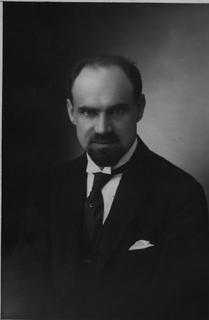Ernestas Galvanauskas

Ernestas Galvanauskas (born November 20, 1882 in Zizonys, Biržai district municipality; died July 24, 1967 in Aix-les-Bains, France) was a Lithuanian engineer, politician and one the founders of the Lithuanian Peasants' Union (which later merged with the Lithuanian Popular Peasants' Union). He also served twice as Prime Minister of Lithuania.
Biography
In 1902 Galvanauskas completed his secondary education at the Gymnasium of Jelgava, Latvia. He then took up studies in engineering in St. Petersburg, Russia. In 1905 he was active in the Russian Revolution of 1905 in Lithuania, and founded the Lithuanian Peasants' Union. Later he was elected as a delegate to the Great Seimas of Vilnius
Between 1906-1919 he lived first in Finland, and then in Belgium, where he completed his studies and received a diploma in mining engineering. In 1919 he was a member of the Lithuanian delegation at the Versailles Conference being held in Paris. In October 1919, Galvanauskas became Prime Minister of Lithuania, and held this office until April 1920. During that time he also held the offices of Finance, Trade, and Minister of Industry. In 1921 Galvanauskas was also a delegate to the League of Nations, where he worked to establish international recognition of Lithuania.
Between February 1922 and June 1924, Galvanauskas was also Lithuanian Minister of Foreign Affairs. During this period, Galvanauskas' efforts also helped to establish the University of Lithuania in 1923.
Klaipėda years
Galvanauskas was a major force behind the Klaipėda Revolt. Afterwards Galvanauskas led the Lithuanian delegation in Paris, that negotiated the Klaipėda Convention to determine the future of the Klaipėda Region.
Between 1924 and 1927, Galvanauskas was accredited to the Court of St. James's in London and became Lithuania's ambassador to Great Britain. After the 1926 Lithuanian coup d'état he resigned from that post and returned to Klaipėda where he devoted himself mostly to teaching. In 1927-1928 he was chairman of Klaipėda's port board, chairman of Klaipėda's Teachers Society, and between 1934-1939 he established the Klaipėda Commerce Institute, and was its director. He was involved in re-organizing Klaipėda's woodworking industry, and founded a building company that constructed apartments for workers. He also founded Klaipėda's Trade School. He was member of the board of directors for the Rytas publishing house, and chief editor of the newspaper Vakarai.
In 1939-1940 he became Lithuanian Minister of Finance, but after the first Soviet occupation he fled to Klaipėda, which had been reoccupied by Germany in 1939. In 1941 the Nazi's arrested him and he was sent into exile.
Exile
At the end of 1946 Galvanauskas became head of the Supreme Committee for the Liberation of Lithuania. In 1947 he emigrated to Madagascar where he taught courses on commerce and industry. In 1963 Galvanauskas moved to France and lived there until his death.
Publications
- „Valstija ir mokesčiai” 1909,
- „Pologne et Lithuanie”, 1923,
- „Atsiminimai” 1925
External links
- (Lithuanian) Short bio
- (Lithuanian) More expanded bio
| Preceded by Mykolas Sleževičius Kazys Grinius |
Prime Minister of Lithuania 7 October 1919 – 19 June 1920 2 February 1922 – 18 June 1924 |
Succeeded by Kazys Grinius Antanas Tumėnas |
|